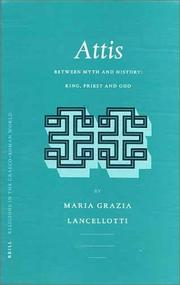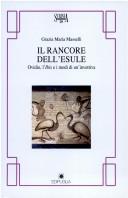| Listing 1 - 10 of 14 | << page >> |
Sort by
|

ISBN: 9004128514 9004295976 9789004128514 Year: 2002 Volume: 149 Publisher: Leiden Brill
Abstract | Keywords | Export | Availability | Bookmark
 Loading...
Loading...Choose an application
- Reference Manager
- EndNote
- RefWorks (Direct export to RefWorks)
This volume deals with the figure of Attis. The work aims to reconsider the mythical and cultic information about this character, trying to provide proof of the processes of 'construction' and 'reconstruction' that have contributed to the moulding of the different forms of Attis that developed as a result of various demands within different religious traditions. After an introduction about the history of the studies, the first part examines the oldest evidence on Attis, resorting to comparison with religious traditions earlier than or contemporary with Phrygian culture. The second part tackles the classical world and collects the elements of continuity and of innovation in respect of Asianic religious traditions. The third part analyses the problem of the processes of reinterpretation of the traditional cults that both the 'pagan' philosophers and the fathers of the Church effected. The link between Attis and Death is discussed in the fourth part.
Attis (Divinité grecque) --- Attis (Greek deity) --- Attis (Griekse godheid) --- Atys --- Cultes grecs --- Cults [Greek] --- Cultussen [Griekse ] --- Attis (God) --- Cultus, Greek --- Attis (Divinité) --- Cults --- 292.2 --- -Alternative religious movements --- Cult --- Cultus --- Marginal religious movements --- New religions --- New religious movements --- NRMs (Religion) --- Religious movements, Alternative --- Religious movements, Marginal --- Religious movements, New --- Religions --- Sects --- Atys (God) --- Gods --- Godsdiensten van de Romeinen --- -Godsdiensten van de Romeinen --- 292.2 Godsdiensten van de Romeinen --- Attis (God). --- -Atys (God) --- Alternative religious movements --- Attis (Divinité) --- Attis --- Cults - Greece. --- Cults - Greece

ISBN: 8872283418 9788872283417 Year: 2002 Publisher: Bari Edipuglia
Abstract | Keywords | Export | Availability | Bookmark
 Loading...
Loading...Choose an application
- Reference Manager
- EndNote
- RefWorks (Direct export to RefWorks)
Blessing and cursing in literature. --- Enemies in literature. --- Blessing and cursing --- Enemies --- Blessing and cursing. --- Enemies. --- Invektive. --- Ovid, --- Ovidius Naso, Publius. --- Ibis (Ovid). --- Blessing and cursing in literature --- Enemies in literature --- Adversaries --- Antagonists --- Enemies (Persons) --- Foes --- Opponents --- Hostility (Psychology) --- Cursing and blessing --- Execration --- Imprecation --- Malediction --- Incantations
Book
Abstract | Keywords | Export | Availability | Bookmark
 Loading...
Loading...Choose an application
- Reference Manager
- EndNote
- RefWorks (Direct export to RefWorks)
Book
ISBN: 8876440925 Year: 1987 Publisher: Milano : Libri Scheiwiller,
Abstract | Keywords | Export | Availability | Bookmark
 Loading...
Loading...Choose an application
- Reference Manager
- EndNote
- RefWorks (Direct export to RefWorks)
Almanacs, Italian --- Popular culture --- Bibliography --- Catalogs. --- Bibliography --- Catalogs. --- Biblioteca nazionale braidense --- Catalogs. --- Milan (Italy) --- Imprints --- Catalogs.
Book
ISBN: 9788872285763 Year: 2009 Publisher: Bari Edipuglia
Abstract | Keywords | Export | Availability | Bookmark
 Loading...
Loading...Choose an application
- Reference Manager
- EndNote
- RefWorks (Direct export to RefWorks)
Magic in literature --- Rejuvenation in literature --- Ovid,
Book
ISBN: 9781509937455 1509937455 Year: 2020 Publisher: Oxford: Hart,
Abstract | Keywords | Export | Availability | Bookmark
 Loading...
Loading...Choose an application
- Reference Manager
- EndNote
- RefWorks (Direct export to RefWorks)
"Environmental crime is a growing challenge for policy makers and law enforcers. This is an important and timely study which examines in depth how environmental crime is treated at national level within the European Union and the impact of the 2008 EU Directive on environmental crime on national systems. It will be required reading by anyone concerned with making environmental law more effective."Richard Macrory, Emeritus Professor, University College LondonThe aim of this important new collection is to explore how environmental crime is controlled and environmental criminal law is shaped and implemented within the European Union and its Member States. It examines the legal framework, looking in particular at Directive 2008/99/EC, and the specific competences of the EU in this domain. In addition, it provides a detailed analysis of environmental criminal law in seven Member States, focusing inter alia on the basic legislation, the way in which environmental pollution is criminalised and the main actors in place to enforce environmental criminal law. In so doing, it provides a much needed explanation of the evolution of environmental criminal law in Europe at Union level and how this is implemented in selected Member States
Book
Year: 2007 Publisher: Parma Museo Bodoniano
Abstract | Keywords | Export | Availability | Bookmark
 Loading...
Loading...Choose an application
- Reference Manager
- EndNote
- RefWorks (Direct export to RefWorks)
Book
ISBN: 9788878474727 Year: 2014 Publisher: Parma MUP
Abstract | Keywords | Export | Availability | Bookmark
 Loading...
Loading...Choose an application
- Reference Manager
- EndNote
- RefWorks (Direct export to RefWorks)
Book
Year: 1974 Publisher: Milano Il Polifilo
Abstract | Keywords | Export | Availability | Bookmark
 Loading...
Loading...Choose an application
- Reference Manager
- EndNote
- RefWorks (Direct export to RefWorks)
Book
ISBN: 9788818038439 Year: 2023 Publisher: Santarcangelo di Romagna : Rusconi Libri,
Abstract | Keywords | Export | Availability | Bookmark
 Loading...
Loading...Choose an application
- Reference Manager
- EndNote
- RefWorks (Direct export to RefWorks)
Presentato dallo stesso autore come libellus lepidus e novus, l'eterogeneo corpus di poesie di Catullo, con i suoi 116 componimenti, riflette i canoni di un nuovo comporre, erudito e raffinato, in grado di tradurre il linguaggio tutto umano dell'interiorità. Dalle nugae agli epigrammi, passando per i carmina docta: il poeta veronese scandaglia con attenta vivacità, non senza una dose di ironia, le sfumature molteplici dell'animo, tra amori, amicizie, pubbliche rivalità, privati impulsi. Con la sua sorridente e viva callidità, Catullo attraversa la tradizione per giungere a esiti di straordinaria originalità: la sua raccolta, multiforme eppur coerente nei toni e nelle tematiche, ci giunge come attuale mosaico di autentici sentimenti umani.
| Listing 1 - 10 of 14 | << page >> |
Sort by
|

 Search
Search Feedback
Feedback About UniCat
About UniCat  Help
Help News
News